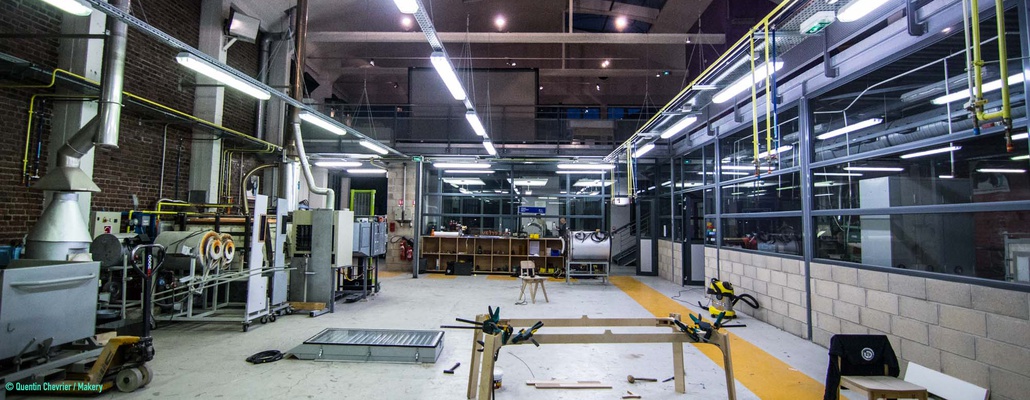10:00-11:00am | Sound design methodology : articulation between theory and practices
With Olivier Houix, Nicolas Misdariis and Patrick Susini, researchers in Perception and Sound Design Team at IRCAM-STMS
The activity of sound design is setlled at Ircam since the 2000s and has been progressively developed in order to associate this polyvalent artistic discipline with scientific knowledge, methodologies and tools, especially from the auditory perception and cognition field of research. A new step of devlopment is about to come out and globally aims at considering sound design through the prism of design and science of design as defined by Cross: "the study of the principles, practices and procedures of [sound] design" (Cross, 2001) This past, present and future of sound design at Ircam will be presented and deeply illustrated with two fields of application: in research, a presentation of the Skat-VG project dealing with concept and tools of sound sketches with the use of voice and gesture; ii/ in pedagogy, a presentation of the Sound Design Master cursus at ESBA TALM (School of Fine Arts, Le Mans) and especially the workshop methodology that is annually applied with a mixed group of designer / sound designer students and an industrial partner proposing a real use case
11:00am - noon | Designing for Sound and the Social
With Cecilia Wee, professor at the Royal College of Art, London
Matt Lewis, musician, sound-artist and founder of the Call & Response, London
Will Renel, researcher at the Helen Hamlyn Centre for Design of Royal College of Art, London
Every sound has a social relation, but the development of new technological tools most often focusses on musical or sonic output. Software and hardware originally designed for music-making are constantly being adapted, hacked and reconfigured for other design contexts - such recontextualisations point to new ways of thinking about how sound design can impact on other disciplines. With backgrounds in art, design and music, and interests that cross over into social, political, medical, computing and physical sciences, the Social Sound Research group at the School of Communication, Royal College of Art, London, is rethinking the potential of sound as a key area for contemporary communication design. This presentation explores how sound can be used to articulate, enhance and modulate our societies, examining how sound practice can effect and shape contemporary human experience and social interaction. Drawing on examples ranging from identifying and protecting soundmarks, architectural practice, public announcements and public art, we demonstrate the need for more holistic approaches to sound in the public realm, informed by both social design, and sophisticated, engaging sonic results.
Noon–1:30pm | Panel Discussion: Makers, Design, and Collaborative Economy
With Sébastien Broca, sociologist, université Paris-1-Panthéon-Sorbonne
Amélie Capon, lawyer
Marie-Christine Bureau, sociologist, researcher, CNRS- Cnam
Vincent Guimas, co-founder of Nouvelle Fabrique
Collectif Ippolita
Facilitator: Anne-Cécile Worms, founder and president of the company Art2M
3-4:30pm | Conferences: New Instrument-Making Techniques
3:00pm - Frédéric Bevilacqua and Emmanuel Fléty, researchers at IRCAM-STMS
; Hugo Placido da Silva, co-founder of the company
Multimodal interaction tools for hackers and artists
Multimodal interaction, including gestures and movements, has become a major topic in scientific research and innovation. The applications span from Human Computer Interaction, health, well-being, sports to all digital arts. In performing arts, the use of wireless motion sensing allows for interaction with digital media such as sound and visuals. Gestures and body movements can be analyzed in real-time, using tools such as interactive machine learning, allowing artists to define their own movement vocabularies. In this talk we will present the R-IoT, a wireless movement-sensing device (with 3D accelerometers, gyroscopes and magnetometers) that has been developed for the artistic and hacker communities. It can be combined with bio-sensing hardware and sensors (e.g. heart beat, muscle activity, sweating, brain waves) by using the BITalino ecosystem from the PLUX company.
3:30pm – Adrien Mamou-Mani, founder of the startup HyVibe
Hybridization of Acoustic and Digital Instruments
We are currently experiencing a major turning point in the history of acoustic musical instruments. The scientific understanding of their behavior as well as its implementation in technological devices increasingly smaller and light, have brought, in recent years, a new family of hybrid instruments: electroacoustic, but also electronic and digital. I will present a recent history of these instruments. We will see how their maturation is permitted by collaborative works between all the craftsmen of music (luthiers, researchers, technicians, composers, engineers, instrumentalists), including the production of prototypes, repertoire and concerts. Finally, I will discuss the current commercial challenges of this new market, introducing HyVibe, a new company I founded.
4:00pm – Pauline Eveno, founder of the startup SYOS
SYOS, Custom Made 3D Printing for Sound
SYOS offers musicians tailor-made sound with customized acoustic musical instruments, printed in 3D. Our first products are saxophone mouthpieces. The mouthpiece is a small part of the saxophone but it is at the interface between the musician and the rest of the instrument. In an algorithm, we discovered the link between the vocabulary of the musician describing the sound he dreams of making and the geometry of the mouthpiece enabling him to obtain this sound. Our mouthpieces have been marketed for a year and they are already played by national and international stars of jazz, rock, electro ...
Facilitator:Hugues Vinet, Director of the IRCAM Research and Development Department
4:30- 6pm | Panel Discussion: Design
With Paola Antonelli, Senior curator of Architecture & Design, MoMa
Marie-Ange Brayer, Curator, Head of the department Design et Industrial Prospective, Mnam/Cci-Centre Pompidou
François Brument, designer
Nicolas Henchoz, founder and director of EPFL+ECAL Lab
Sylvain Lefebvre, researcher at Inria
6:30pm | Encounter: Forms and Mathematisation of the World
With Alain Prochiantz, neurobiologist, professor at the Collège de France
and Alain Connes, mathematician, professor at the Collège de France and the IHES.
Facilitator: Moreno Andreatta.
Free entry. Limited seats available
Photo : Quentin Chevrier / Makery
At IRCAM we can...
Make music with open-hardware, design a musical object from start to finish, compose the musicality of a movement, understand sonification.




